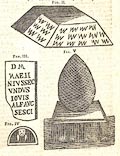




Coning Garth
Mr URBAN,
I SEnd you some pieces of antiquity, which I lately discovered in the wall and adjoining houses of an obscure farm at Coning-garth, about 2 short miles southward from Wigton, in Cumberland, and not far from a large Roman encampment, called Old Carlisle, on the military way leading to Ellenborough.
Old Carlisle has been variously understood by antiquaries; but Mr Horsley's opinion, that it was the Roman Olenacum, seems to have the greatest weight, where the Ala Herculea encamp'd at the time of the Notitia.


FIG. I. is a Triton; the stone is about 2 1/2 foot by 16 inches; whether there has been any figure on the other sides cannot be learn'd, as 'tis built in the wall; it is in full demi-relievo, and tolerably well executed, at least much better than many sculptures of those times, but 'tis imperfect; below the tail has been another figure, but the stone is broke off; and, facing the Triton a third also defac'd and imperfect.


FIG. II. is the corner stone of a stable, or barn, at the very foundation, probably a pedestal to a funeral monument. The figures on it resemble scales, or waves, and whether it has been a plinth for the Triton, and the whole a sepulchral pillar, is not now to be determin'd.
FIG III. is an inscription, now placed horizontally, as the upper lintel of a window near the Triton, by which it seems probable that the Ala Augusta had some time garrison'd this place; it is of the funeral kind, and dedicated to the Dis Manibus. I hope the curious will oblige us with their reading and interpretation of it.
FIG. IV. is a view of a stone, which I take to be the capital of the whole monument; the length of the plinth is 17 1/2 inches, breadth 12, height 7 inches, of which 2 are edg'd away in a slope moulding, and the spheroid on the plinth is 20 inches

 high,
high,


 Gents Mag 1748 p.179
Gents Mag 1748 p.179